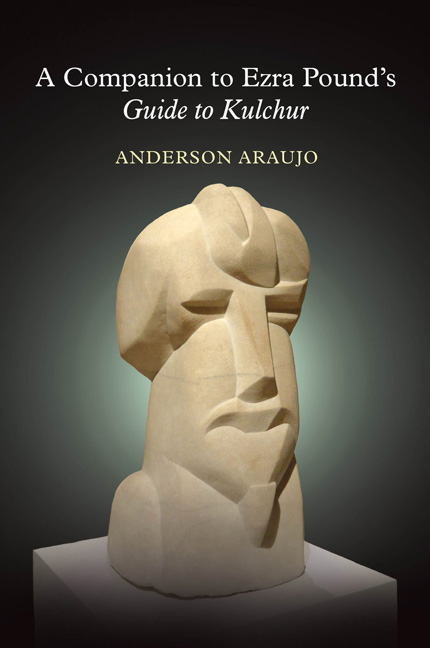Book contents
- Frontmatter
- Contents
- Acknowledgments
- Abbreviations
- Introduction
- Guide to Kulchur
- Part I
- Section I
- Section II
- Part II
- Section III
- Section IV
- Part III
- Section V
- Section VI
- Part IV
- Section VII
- Section VIII
- Section IV
- 38 Education Or Information
- 39 Neo-Platonicks Etc.
- 40 Losses
- 41 Odes: Risks
- 42 Great Bass: Part Two
- 43 Tone
- Part V
- Section X
- Section XI
- Part VI
- Section XII
- Section XIII
- Addenda: 1952
- Notes
- Index
43 - Tone
from Section IV
- Frontmatter
- Contents
- Acknowledgments
- Abbreviations
- Introduction
- Guide to Kulchur
- Part I
- Section I
- Section II
- Part II
- Section III
- Section IV
- Part III
- Section V
- Section VI
- Part IV
- Section VII
- Section VIII
- Section IV
- 38 Education Or Information
- 39 Neo-Platonicks Etc.
- 40 Losses
- 41 Odes: Risks
- 42 Great Bass: Part Two
- 43 Tone
- Part V
- Section X
- Section XI
- Part VI
- Section XII
- Section XIII
- Addenda: 1952
- Notes
- Index
Summary
there is a right speed for a piece or movement: Pound had made much the same argument in The New Age of January 3, 1918:
The tempo of every masterwork is definitely governed; and not only the general tempo of the whole work, but the variations in speed, the tempo of individual passages, the time interval between particular notes and chords. The actual sound of a given note or chord needs a certain time to round itself out before the next sound is imposed or shot after it … The sense of the real tempo may be instinctive and incommunicable.
Towser: A stock name for a large dog or an energetic person.
A. Waley: Arthur David Waley (1889–1966), Cambridgeeducated sinologist and translator of, among other works, The Nō Plays of Japan (1922) and The Analects of Confucius (1938). Pound met Waley in London during the First World War. Waley apparently found Pound's translations of Li Po's poetry in Cathay not up to par, retranslating several of the poems in a paper presented at the China Society at the School of Oriental Studies in London.
POLLON D'ANTHRŌPON IDEN: Cf. note GK 99. The macron diacritic in “D'ANTHROPŌN” has been shifted incorrectly to the first “O.”
The Homeric Epos: Homer's epic poems, The Iliad and The Odyssey (cf. note GK 24).
The Odes: Cf. note GK 121.
Metamorphoses: Cf. note GK 149–50.
Divina Commedia: Cf. note GK 2.
Cocteau: Cf. note GK 93.
Montaigne: Cf. note GK 23.
With 309 concerti of Vivaldi unplayed, lying in Turin: Cf. note GK 148. In 2012, a new manuscript version dated to 1714 of Vivaldi's opera Orlando Furioso, containing as many as twenty new arias, was discovered among the vast collection of the composer's personal papers at Turin's Biblioteca Nazionale.
Y …: Yale University.
The basis of credit is the abundance of nature … the whole people: In Social Credit: An Impact (1935), Pound constructs a similar argument to illustrate the virtues of Siena's Monte dei Paschi bank, “The CREDIT rests in ultimate on the ABUNDANCE OF NATURE, on the growing grass that can nourish the living sheep” (cf. note GK 194).
- Type
- Chapter
- Information
- A Companion to Ezra Pound's Guide to KulcherGuide to Kulcher, pp. 257 - 260Publisher: Liverpool University PressPrint publication year: 2018

